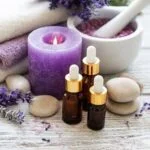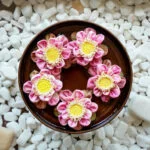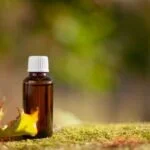Aromatherapy is a form of holistic healing that has been practiced for centuries, harnessing the power of aromatic plants to promote physical and mental well-being. In this article, we will explore the intricacies of aromatherapy and delve into the question: how does aromatherapy work in the body?
Throughout history, humans have recognized the therapeutic benefits of scent. Ancient civilizations such as Egypt, Greece, and China were among the first to utilize aromatic plants for medicinal purposes. These early practices laid the foundation for what we now know as aromatherapy.
Aromatherapy involves using essential oils derived from various plant sources to evoke specific physiological and psychological responses. These oils are obtained through methods such as steam distillation or cold pressing, resulting in highly concentrated extracts that capture the essence and fragrance of the plants.
In order to understand how aromatherapy works in our bodies, it is important to explore our sense of smell. Our olfactory system plays a key role in detecting scents and transmitting signals to our brain, which then triggers emotional and physiological responses. This powerful connection between scent and our emotions is what forms the basis of aromatherapy’s impact on our well-being.
Throughout this article, we will examine how essential oils enter our body through absorption methods such as inhalation or topical application. We will also uncover the science behind the physiological effects of these aromatic compounds on our bodies.
By gaining a deeper understanding of aromatherapy’s historical use and its impact on our senses and physiology, we can begin to appreciate its potential benefits in improving both physical and mental health. So let’s embark on this aromatic journey together and discover how integrating aromatherapy into our daily lives can enhance overall well-being.
The Power of Scents
Our sense of smell is a powerful tool that can evoke emotions, trigger memories, and even influence our behavior. The process of smelling occurs when odor molecules stimulate the olfactory receptors in our noses, sending signals to the brain for interpretation. This complex system allows us to perceive and differentiate between various scents, playing an integral role in our daily lives.
The Physiology of Smell
When we inhale a scent, odor molecules travel through our nasal passages and come into contact with the olfactory receptors located within the lining of the nose. These receptors are specialized nerve cells that recognize specific odor molecules. When stimulated by these molecules, they send electrical signals to the olfactory bulb, which is responsible for processing smells.
The Limbic System and Emotional Response
Once the olfactory bulb receives the electrical signals from the olfactory receptors, it relays this information to several areas in the brain including the limbic system. The limbic system is associated with memory, emotions, and motivation. This connection between scent and emotion explains why certain smells can trigger strong emotional responses or bring back vivid memories.
Research has shown that certain scents like lavender can promote relaxation and reduce anxiety levels due to their effects on the limbic system. On the other hand, citrus scents such as lemon or orange may enhance mood and increase alertness. Understanding these connections between scent and emotion can be harnessed through aromatherapy to achieve specific mental or emotional states.
Behavioral Effects of Scents
Apart from influencing emotions, scents can also impact our behavior. For example, studies have shown that certain smells can affect appetite and cravings. In one study published in the journal Chemical Senses, researchers found that individuals who were exposed to a pleasant aroma had reduced cravings for sweet foods compared to those exposed to an unpleasant scent.
Additionally, research has indicated that certain scents can enhance cognitive function and improve focus. For instance, the scent of rosemary has been found to enhance memory performance, while peppermint has been shown to increase alertness and overall cognitive performance.
Essential Oils
Essential oils are highly concentrated plant extracts that capture the natural aroma and beneficial properties of plants. These oils are typically obtained through a process called steam distillation, where steam is passed through the plant material to separate the volatile compounds. After condensation, the essential oil is separated from the water, resulting in a potent and aromatic liquid.
Another method commonly used to extract essential oils is cold-press extraction, which is primarily used for obtaining oils from citrus fruits such as oranges, lemons, and grapefruits. In this method, mechanical pressure is applied to the fruit peel to release the essential oil. This technique allows for a greater yield of oil with minimal alteration to its chemical composition.
It’s important to note that not all plant materials can produce essential oils. Certain plants have specialized structures, such as resin glands or glandular hairs, which contain these valuable compounds. Examples of such plants include lavender, peppermint, eucalyptus, and tea tree. These plants have been recognized for their therapeutic properties for centuries and continue to be widely used in aromatherapy practices today.
To summarize, essential oils are highly concentrated plant extracts obtained through methods like steam distillation or cold-press extraction. These natural substances contain aromatic compounds that contribute to their distinct scents and therapeutic benefits. By harnessing the power of these essential oils, aromatherapy aims to enhance physical and mental well-being through their myriad of healing properties.
Absorption Methods
Inhalation
One of the most common methods of absorption in aromatherapy is inhalation. When we inhale, the molecules from essential oils are carried into the nasal cavity where they stimulate the olfactory system. These molecules then bind to receptors on nerve cells and send signals to the brain, specifically to areas associated with emotions and memory. This is why certain scents can trigger feelings of happiness or relaxation.
Inhalation can occur through several different techniques. One popular method is using an essential oil diffuser, which disperses a fine mist of oil particles into the air for inhalation.
Another option is adding a few drops of essential oil to a bowl of hot water and inhaling the steam by placing a towel over your head and leaning over the bowl. Alternatively, you can simply inhale directly from the bottle or apply a drop of oil onto a tissue or cotton ball and hold it close to your nose.
Topical Application
Another way that aromatherapy enters the body is through topical application. When applied directly to the skin, essential oils can be absorbed into the bloodstream through hair follicles, sweat glands, and cell membranes. From there, they are circulated throughout the body.
Before applying essential oils topically, it is important to dilute them in a carrier oil such as jojoba oil or almond oil to prevent skin irritation. The mixture can then be massaged onto different areas of the body depending on your specific needs. For example, lavender oil may be applied to temples for headache relief or peppermint oil can be rubbed onto sore muscles for pain relief.
Ingestion (Oral Intake)
While less common than inhalation or topical application, ingestion is another method by which aromatherapy can enter the body. However, this method should only be used under the guidance of a qualified professional as certain essential oils can be toxic if ingested improperly. It is important to note that not all essential oils are safe for internal use.
To ingest essential oils, they can be added to a beverage or used in cooking. For example, adding a drop of lemon essential oil to a glass of water can provide a refreshing taste and potential health benefits. It is crucial to follow proper dosage guidelines and consult with a healthcare professional before using any essential oil internally.
By understanding the various absorption methods of aromatherapy, individuals can choose the most effective way to experience its benefits. Whether through inhalation, topical application, or even ingestion under proper guidance, aromatherapy has the potential to positively impact both physical and mental well-being.
The Science Behind It
Aromatherapy is not just about pleasant scents and relaxation; there is also a scientific basis behind its physiological effects on the body. When we inhale essential oils, odor molecules travel through the nose and interact with sensory receptors in our olfactory system. These receptors are connected to the limbic system in the brain, which plays a crucial role in regulating emotions, memory, and behavior.
Research has shown that different scents can have varying effects on our mood and physiology. For example, lavender essential oil is known for its calming properties and can help reduce anxiety and promote better sleep. On the other hand, citrus oils like lemon or orange can have an energizing effect and enhance focus and concentration.
The physiological effects of aromatherapy extend beyond just the olfactory system. Inhaling essential oils can also affect other systems in the body, such as the respiratory system. Certain oils, like eucalyptus or peppermint, can help relieve congestion and improve breathing. Additionally, some studies have suggested that aromatherapy may influence the immune system by promoting a balanced immune response.
| Physiological Effects | Examples |
|---|---|
| Calming | Lavender essential oil reducing anxiety levels |
| Energizing | Citrus oils enhancing focus and concentration |
| Respiratory relief | Eucalyptus and peppermint oils improving breathing |
| Immune system modulation | Aromatherapy promoting balanced immune response in some studies |
Benefits of Aromatherapy
Aromatherapy has been used for centuries as a natural way to improve physical and mental well-being. The use of essential oils and their therapeutic properties have been found to provide various benefits that contribute to overall health.
One of the main benefits of aromatherapy is its ability to promote relaxation and reduce stress. Certain scents, such as lavender and chamomile, have been shown to have a calming effect on the mind and body.
Inhaling these fragrances can help to alleviate feelings of anxiety and promote a sense of peace and tranquility. A study published in the Journal of Alternative and Complementary Medicine found that the inhalation of lavender essential oil reduced heart rate and blood pressure, indicating a relaxation response in participants.
In addition to reducing stress, aromatherapy can also enhance mood and improve mental clarity. Scents like citrus or peppermint have uplifting properties that can help combat feelings of sadness or fatigue. Research has shown that lemon essential oil has antidepressant effects, while peppermint oil has stimulating properties that can enhance focus and concentration.
Furthermore, aromatherapy can be beneficial for physical well-being as well. Essential oils such as eucalyptus or tea tree oil have antimicrobial properties that can support the immune system and protect against pathogens. Inhalation or topical application of these oils may help relieve congestion or soothe minor skin irritations.
In summary, aromatherapy offers a natural approach to improving physical and mental well-being by utilizing the therapeutic properties of essential oils. Whether it’s promoting relaxation, enhancing mood, or supporting overall health, incorporating aromatherapy into daily life can provide numerous benefits for both mind and body.
| Benefits | Data |
|---|---|
| Promotes relaxation | Calming scents like lavender reduce heart rate and blood pressure |
| Enhances mood and mental clarity | Uplifting scents like citrus or peppermint have antidepressant effects and improve focus |
| Supports physical well-being | Essential oils with antimicrobial properties protect against pathogens and relieve congestion or skin irritations |
Common Misconceptions
Aromatherapy has gained popularity in recent years, but there are still many common misconceptions surrounding its use. It is important to separate the facts from fiction when it comes to understanding aromatherapy and its benefits. Let’s explore some of the most common misconceptions and debunk them with the facts.
Misconception 1: Aromatherapy Is Just a Pleasant Scent
One of the biggest misconceptions about aromatherapy is that it is simply about enjoying pleasant scents. While aromatherapy does involve inhaling essential oils for their aromatic properties, it goes beyond just smelling nice. Essential oils have therapeutic properties that can impact our physiological and psychological well-being. For example, certain essential oils like lavender or chamomile have calming effects and can aid in relaxation or sleep improvement.
Misconception 2: Essential Oils Are All the Same
Another misconception is that all essential oils are created equal. In reality, every essential oil has its own unique chemical composition and properties. This means that different oils will have different effects on the body and mind. For example, peppermint oil is known for its energizing and invigorating qualities, while eucalyptus oil is commonly used for respiratory support.
Misconception 3: Aromatherapy Doesn’t Have Any Scientific Basis
Some people believe that aromatherapy is simply a placebo effect or lacks scientific evidence to support its claims. However, numerous studies have shown the effectiveness of aromatherapy in various applications. Research has shown that certain essential oils can reduce stress levels, alleviate headaches, improve sleep quality, and even enhance cognitive function. While more research is needed to fully understand the mechanisms behind these effects, there is no denying the growing body of scientific evidence supporting the benefits of aromatherapy.
Safety Precautions
Using aromatherapy can be a safe and effective way to promote wellness and relaxation. However, it is important to take certain safety precautions when using essential oils to ensure that they are used responsibly and do not cause any harm.
Firstly, it is crucial to remember that essential oils are highly concentrated substances and should never be used directly on the skin without dilution. They should always be mixed with a carrier oil, such as coconut oil or jojoba oil, before applying them topically. This helps to prevent skin irritation or sensitization reactions that may occur if the oils are applied undiluted.
Another important safety measure is to perform a patch test before using any new essential oil. Apply a small amount of the diluted mixture onto a small area of your skin (such as your forearm) and wait for 24 hours to see if any adverse reactions occur. If you experience redness, itching, or swelling, it is best to avoid using that particular oil or seek guidance from a qualified aromatherapist.
In addition, it is vital to keep essential oils out of reach of children and pets. Some essential oils can be toxic if ingested or have adverse effects on animals. Be cautious when diffusing oils in your home, ensuring that pets have an escape route if they feel overwhelmed by the aroma.
By following these safety precautions, you can enjoy the benefits of aromatherapy without putting yourself at risk. It’s also worth noting that consulting with a qualified aromatherapist can provide further guidance on how to use specific oils safely based on your individual needs and health conditions.
Integrating Aromatherapy in Daily Life
Incorporating aromatherapy into your daily life can have numerous benefits for your physical and mental well-being. By understanding the power of scents and how they interact with our sense of smell, you can harness the potential of aromatherapy to enhance your overall health. In this section, we will provide practical tips on how to integrate aromatherapy into your routine.
One simple way to incorporate aromatherapy is through the use of essential oil diffusers. These devices disperse the scent molecules into the air, allowing you to enjoy their therapeutic effects throughout your home or office space. You can choose a diffuser that suits your preferences, whether it be a traditional plug-in diffuser or a portable one that you can take with you wherever you go.
Another option is to create your own personal inhaler by adding a few drops of essential oil onto a cotton ball or tissue. This convenient method allows you to carry the scent with you and inhale it whenever you need a quick boost or relaxation.
Additionally, you can incorporate aromatherapy into your self-care routine by using essential oils in baths or showers. Add a few drops of lavender essential oil to warm bathwater for a calming effect, or try eucalyptus oil in your shower for an invigorating start to the day.
Furthermore, consider using essential oils topically by incorporating them into massage oils or adding them to unscented lotions. This not only brings the aroma directly to your skin but also promotes deeper relaxation and rejuvenation.
Remember, always approach aromatherapy with caution and respect for safety precautions such as diluting essential oils and avoiding direct contact with sensitive areas such as eyes or mucous membranes.
By integrating aromatherapy into your daily life using these practical tips, you can experience its many benefits firsthand. Enhance your overall well-being, promote relaxation and focus, and enjoy the therapeutic power of scents in every aspect of your routine.
Frequently Asked Questions
How Does Aromatherapy Help the Body?
Aromatherapy is a holistic practice that utilizes essential oils extracted from plants to promote physical, emotional, and mental well-being. When inhaled or applied topically, these aromatic oils can have various effects on the body. They can help relax muscles and promote better sleep by reducing stress and anxiety.
Some oils also possess antimicrobial properties, supporting the immune system’s ability to fight off infections. Aromatherapy may also aid in reducing pain and inflammation, enhancing digestion, and improving overall circulation. Overall, aromatherapy offers a natural and pleasant way to support the body’s health and balance.
How Does Aromatherapy Work Scientifically?
Scientifically, aromatherapy works through several mechanisms of action. The inhalation of essential oils stimulates the olfactory system in our nose, triggering the limbic system in the brain responsible for emotions and memory. This interaction creates an emotional response and influences our mood, stress levels, and cognitive function.
Additionally, when applied topically, essential oils can be absorbed into the bloodstream and work through pharmacological actions on various body systems. For example, some compounds found in certain essential oils have been shown to exhibit analgesic or anti-inflammatory properties when applied on the skin.
What Does Aromatherapy Do to the Brain?
Aromatherapy has a profound impact on the brain due to its influence on the limbic system mentioned earlier. The limbic system plays a crucial role in regulating emotions, behavior, memory formation, and even certain physiological functions like heart rate and blood pressure. Inhaling aromatic molecules from essential oils directly affects this part of our brain and can evoke responses such as relaxation or stimulation depending on the specific oil used.
Certain essential oils have been researched for their ability to calm anxiety, relieve depressive symptoms, improve focus and concentration, or even enhance memory retention. By promoting positive emotional states and reducing stress levels in the brain, aromatherapy offers a powerful tool for emotional well-being and mental health support.

Are you looking for a natural way to improve your health and wellbeing?
If so, aromatherapy may be the answer for you.





